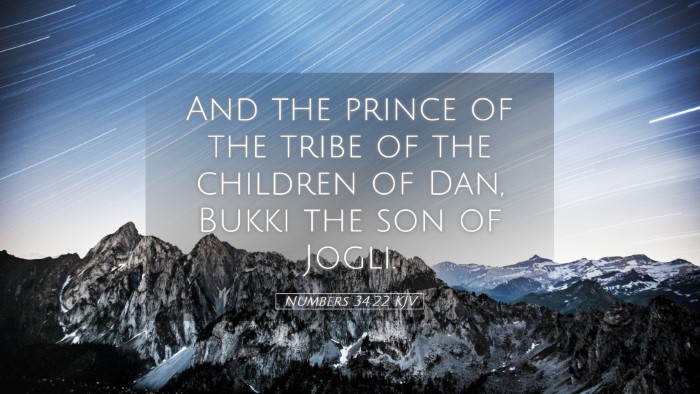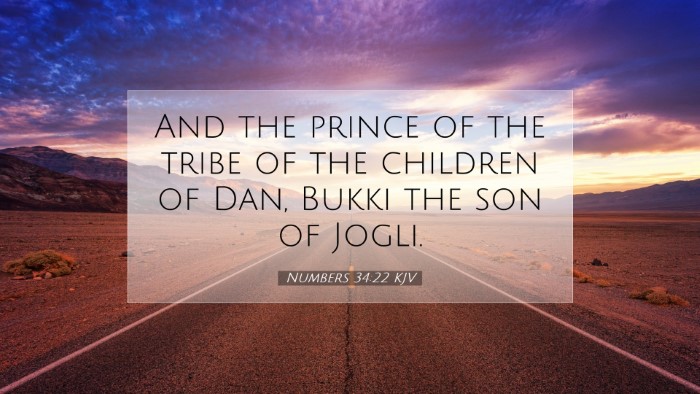Commentary on Numbers 34:22
Verse: "And Eleazar the priest and Joshua the son of Nun, and the chief fathers of the tribes of the children of Israel, distributed the land by lot in Shiloh before the Lord." (Numbers 34:22)
Introduction
This passage marks a significant moment in the history of Israel's journey to possess the Promised Land. With the leadership of Eleazar and Joshua, the distribution of the land represents not just the fulfillment of God's promise to their forefathers but also serves as a practical implementation of divine guidance. This commentary draws insights from respected Bible scholars such as Matthew Henry, Albert Barnes, and Adam Clarke to deepen the understanding of this pivotal event.
The Role of Leadership
1. Leadership Dynamics: The mention of Eleazar the priest and Joshua highlights the collaborative effort in this momentous task. As Matthew Henry notes, the roles of spiritual and civil authority are beautifully intertwined here. Eleazar, representing the priesthood, signifies the necessary spiritual guidance in covenant decisions, while Joshua, as a military leader, embodies the practical aspects of taking possession of the land.
2. Importance of Unity: The chief fathers of the tribes represent inclusivity and unity in decision-making. Albert Barnes emphasizes that leadership must encompass various voices within the community to reflect the will of God accurately. This collective approach fosters transparency and fosters trust among the tribes.
God's Sovereignty in Land Distribution
1. Divine Ordination: The distribution by lot serves as a method that removes human bias and indicates God's sovereign choice in allotting land to His people. Adam Clarke elaborates on how this method reinforces the idea that the land belongs to God and that His will governs its distribution.
2. Lot as Divine Instrument: The use of lots highlights the belief in God’s providence. Both Matthew Henry and Albert Barnes share insights on how this practice was not merely a gamble but an act of faith. It demonstrates the Israelites' reliance on God to direct their paths, acknowledging that ultimately, it is God's sovereign hand that guides both the leaders and the people.
Theological Implications
1. Fulfillment of Promise: This event is a fulfillment of the promise made to Abraham, Isaac, and Jacob—their descendants would inherit the land of Canaan. The commentators stress the significance of this realization, not only as a historical fact but as a tangible manifestation of God’s faithfulness. The land distribution serves as a reminder of God’s covenantal relationships.
2. A Call to Faithfulness: This moment serves as a call to faithfulness among the tribes. Each allotted area signifies not just a place to settle but a charge to live out God’s commandments within the land. Henry’s commentary posits that possessing the land carries with it the responsibility to uphold the divine laws established by God.
Practical Implications for Today's Believers
1. Leadership with Purpose: For contemporary leaders within the church, this passage serves as a model for leadership that integrates spiritual authority and communal input. It calls for pastors and church leaders to seek God’s direction in their decisions, ensuring that their actions reflect God’s will for their congregations.
2. Trusting in God's Providence: The way the land was allocated through casting lots reminds us of the importance of trusting in God's providential care in our lives. Even today, believers are encouraged to rely on prayer and God’s word as their guide. Adam Clarke’s emphasis on divine guidance remains pertinent, urging Christians to seek God earnestly in their decision-making processes.
Conclusion
Numbers 34:22 encapsulates a transformative moment for the Israelites, epitomizing divine faithfulness in action. This passage, interpreted through the insights of renowned commentators, showcases the interplay of leadership, sovereignty, and covenantal promise. For pastors, students, theologians, and scholars alike, this verse serves as a reminder of God’s enduring presence and guidance in the affairs of His people, both then and now. The lessons gleaned foster not only theological depth but also practical applications for faithful living in the modern world.


